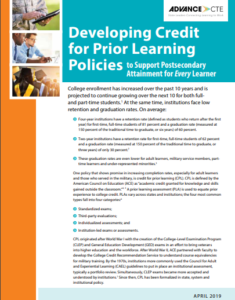While many may think of Career Technical Education (CTE) as operating only at the K-12 level, postsecondary-level CTE programs and pathways are serving millions of learners at institutions across the nation. With most jobs that pay a family-sustaining wage requiring at least some college education — such as a technical certificate, associate degree, bachelor’s degree or another credential of value — postsecondary CTE is more important than ever before in preparing learners for high-skill, high-wage and high-demand careers.
The Strengthening Career and Technical Education for the 21st Century Act (Perkins V) continues to emphasize the importance of postsecondary CTE and the need for alignment across the secondary and postsecondary levels. The new law has a formal definition of program of study (which includes academic and technical content across secondary and postsecondary levels), maintains the requirement that every state and local recipient of funds implement at least one program of study, and calls for each state’s Perkins V plan to include a description of how the split of funds across the secondary and postsecondary levels is determined. As implementation of Perkins V begins, how can states promote quality postsecondary CTE? Check out the resources below to learn more about how states can promote postsecondary attainment, quality and alignment with secondary CTE.
 REPORT: Developing Credit for Prior Learning Policies to Support Postsecondary Attainment for Every Learner: This report by Advance CTE explores the benefits of credit for prior learning (CPL) policies, best practices in CPL across states and what states can do to advance CPL opportunities for learners.
REPORT: Developing Credit for Prior Learning Policies to Support Postsecondary Attainment for Every Learner: This report by Advance CTE explores the benefits of credit for prior learning (CPL) policies, best practices in CPL across states and what states can do to advance CPL opportunities for learners.
REPORT: Driving Quality in Postsecondary CTE: Approval and Evaluation Policies: This report from Advance CTE explores how states can leverage program approval and program evaluation policies and processes to ensure postsecondary CTE program quality. The report examines state examples from California, Florida and Wisconsin.
GUIDE: College-Level Examination Program and Career and Technical Education: This guide from Advance CTE and the College Board examines how specific CLEP exams can be embedded into or used to augment programs of study by Career Cluster.
MORE RESOURCES
- Washington: Direct Transfer Agreements: In Washington State, Direct Transfers Agreements across all public colleges guarantees that a student who obtains a DTA associate degree from a public community or technical college will have completed the core requirements of a public four-year institution.
- Wisconsin: Postsecondary Program Approval and Phase Out: In Wisconsin, programs are approved through a deliberate and structured process.
- Secondary and Postsecondary Split Chart: This chart shows states’ split of funds across secondary and postsecondary in 2018.
Looking for additional resources? Please be sure to check out the Learning that Works Resource Center.

